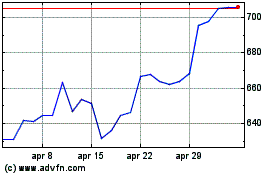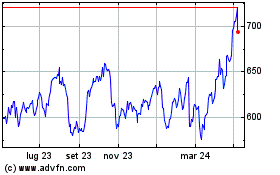HSBC Misses Profit Target as Bad Loan Charges Weigh on Results--2nd Update
20 Febbraio 2018 - 11:47AM
Dow Jones News
By Margot Patrick
LONDON -- HSBC Holdings PLC's full-year profit missed analyst
expectations after the bank was hit by the high-profile collapses
of two borrowers in the U.K. and South Africa.
Debt related to South African retailer Steinhoff International
Holdings NV and U.K. services and construction company Carillion
PLC helped push the bank's bad loan charges to $1.77 billion for
the year, more than expected. Steinhoff announced in December it
had found accounting irregularities and is restructuring. Carillion
went bust in January.
HSBC's shares were down 4% in morning trading in London after
the bank said it would put a share buyback program on hold while it
raises additional debt in the first half of the year. While
marketing the planned $5 billion to $7 billion in additional Tier 1
capital, listing rules prevent it from buying back shares. HSBC
bought back $3 billion in shares last year and incoming CEO John
Flint said Tuesday there has been "no change in our attitude" to
consider buying back more shares after the debt sale is
completed.
Tuesday's results are the last under Chief Executive Stuart
Gulliver, who is retiring from the role after 38 years with the
bank. Mr. Gulliver in an interview said his seven years as CEO
produced "satisfactory" outcomes for shareholders, in a period
marked by several damaging scandals for HSBC and broader shifts in
banking regulation and profitability.
HSBC said its 2017 net profit surged to $9.68 billion from $1.30
billion a year earlier, in part thanks to higher revenue from Asia.
Full-year revenue rose to $51.45 billion from $47.97 billion.
Pretax profit of $17.17 billion was less than the $19.55 billion
estimated in a poll of 20 analysts conducted by FactSet.
As CEO since 2011, Mr. Gulliver oversaw a dramatic reshaping of
153-year-old HSBC, pulling out of countries and exiting dozens of
businesses to improve profits and reduce risks from financial
crime.
The bank's reputation hit a low in 2012 when it agreed to pay
$1.9 billion to settle allowed drug traffickers and sanctioned
nations from moving money through the U.S. financial system. It
pledged to overhaul its compliance systems and entered a five-year
deferred-prosecution agreement with the U.S. Justice Department.
The agreement expired in December without any further action
required.
Mr. Gulliver previously said he would assess his success as CEO
by the bank's stock price at the time of his departure and the
state of HSBC's reputation, among other measures. The shares are up
17% from his start as CEO on Jan. 1, 2011, and 70% since February
2016.
On Tuesday, Mr. Gulliver said the bank has much better controls
and ability now to detect and prevent financial crime, helping to
safeguard its reputation. The bank has met eight of 10 targets Mr.
Gulliver set out in 2015, the two laggards being U.S. profitability
and revenues related to the internationalization of the Chinese
yuan.
Mr. Gulliver's successor, Mr. Flint, is also a career HSBC
banker, having joined in 1989 and most recently served as global
head of retail and wealth management.
--Chester Yung in Hong Kong contributed to this article
Write to Margot Patrick at margot.patrick@wsj.com
(END) Dow Jones Newswires
February 20, 2018 05:32 ET (10:32 GMT)
Copyright (c) 2018 Dow Jones & Company, Inc.
Grafico Azioni Hsbc (LSE:HSBA)
Storico
Da Mar 2024 a Apr 2024

Grafico Azioni Hsbc (LSE:HSBA)
Storico
Da Apr 2023 a Apr 2024
